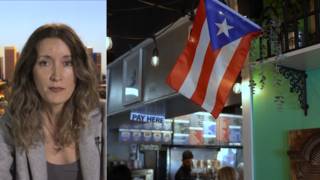
On Tuesday, the Supreme Court heard oral arguments to decide whether Puerto Rico can avoid financial collapse by restructuring a portion of its massive $70 billion debt. The issue before the court was a bankruptcy law Puerto Rico’s Legislature passed in 2014 that would permit the island’s public utilities to restructure about $20 billion those entities owe to bondholders. Known as the Recovery Act, that law was struck down last year after several major bondholders sued successfully in federal court to oppose it. Juan González writes about the case in his new column for the New York Daily News, “Puerto Rico’s future lies in the hands of the Supreme Court.”
Transcript
AMY GOODMAN: This is Democracy Now!, democracynow.org, The War and Peace Report. I’m Amy Goodman, with Juan González. Before we go to the results of the primaries and caucuses, Juan, you wrote a very interesting piece in the New York Daily News, “Puerto Rico’s future lies in the hands of the Supreme Court.”
JUAN GONZÁLEZ: Yes, well, amidst all of the news about the terrorist attack yesterday, not much attention was paid to the fact that the Supreme Court held a hearing and oral arguments on a case involving Puerto Rico, specifically related to its financial problems and its bankruptcy, because in 2014 the Legislature of Puerto Rico passed its own restructuring or bankruptcy act. This was in response to the fact that the federal government did not allow Puerto Rico to use federal bankruptcy laws in a law back in 1984, and the Puerto Rican government, facing major financial problems, passed its own bankruptcy law. But several hedge funds that held bonds, Puerto Rico bonds, then went to court in 2014, and last year a U.S. district court overturned the Puerto Rico law, said that the government of Puerto Rico did not have the constitutional right to have its own bankruptcy law. That was the appealed to the Court of Appeals in Boston, that upheld it, the original decision. And then in—so the hearing before the Supreme Court was over the Puerto Rico government’s appeal of the striking down of its bankruptcy law.
And it was a very interesting hearing, first of all, because in this particular case only seven justices will rule. Not only, obviously, is Justice Scalia no longer on the court, but Justice Alito has recused himself, presumably because he has—he and his wife have investments in Puerto Rico bonds. So he has recused himself, so only seven justices are hearing this case and heard the oral arguments yesterday between the government of Puerto Rico and the bondholders’ lawyers. And interestingly, the four liberal justices, who now have—in this particular case, have a majority, seem to be, in their comments, sympathetic to Puerto Rico’s position. Especially Justice Sotomayor and Justice Ginsburg questioned whether, when Congress eliminated the ability of Puerto Rico to use federal bankruptcy laws, it intended not to allow it to have any kind of bankruptcy laws, which is really the issue at hand.
So you have this situation now that the court will have to rule before June—or by the end of June on this case and presumably may be more sympathetic than Congress, because Congress still hasn’t acted. Remember, Speaker Ryan promised in December that he’d have a bill in the House passed by the House by March 31st. Well, Congress goes out of session today for the Easter recess, doesn’t come back 'til April 12th or 13th, I think, and Ryan has now postponed his promised legislation ’til then. And even then, it's still not clear that the Republicans will approve a bankruptcy provision for Puerto Rico.
So this still leaves the government of Puerto Rico facing massive debt payments—$440 million, I think, due on May 1st—and unable to pay. The secretary of education of Puerto Rico just sent a letter to Speaker Ryan yesterday saying, “Look, we don’t have money in our schools. We haven’t paid for our security guards now for months, and the security guard company has threatened to pull all of its security guards out of the public schools.” There’s an influenza epidemic. The Zika virus is—there are many cases in Puerto Rico. There’s not enough money to provide proper healthcare for the public school students. All of these things, the government says, we need immediate action from the American government. It looks like the Supreme Court may be the only branch of the government that will actually act very soon.
AMY GOODMAN: And, of course, while you were in Puerto Rico last week, students were protesting throughout Puerto Rico, saying, “You’re paying more money on the interest of the debt than investing in our education.” Well, we’re certainly going to continue to cover this, and we’ll link to your piece at democracynow.org.













Media Options